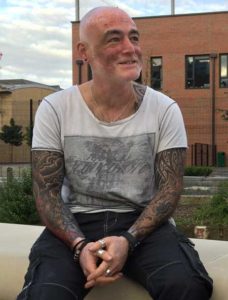 The Future is Gold
The Future is Gold
Dr Luke Beardon,
Autopia (Autism Utopia)
Where/when the world becomes weirdly normal (or where/when weird becomes the new normal)
‘My hypothesis is that there is a pervasive and invidious pattern of thought, behaviour, and belief that is at the heart of a societal ‘norm’, that is, in effect, destroying Autistic lives.
Assumptions are made by people, knowingly or not – ‘if you’ve met one Autistic person, you’ve met them all’ – the idea that good practice is to ‘…consider the other treatments such as psychological interventions’ (NICE guidelines). The need for an Autism awareness day/week/month is exactly representative of the problem.
You have to be problematised before you are allowed to be Autistic. ‘Conform to the norm or be deemed in the wrong…’. The assumption that ‘you have to fit in with society to be considered healthy’ is farce, and sadly perpetuates these negative assumptions.
These views can be found institutionally, as many professionals speak of Autism in the context of a ‘cure’. The concept of Autopia is ‘when Autism becomes an identity rather than a medical diagnostic label’.
The Equality Duty protects people based on factors such as age, gender, sexuality, but for these qualities, absolutely no proof is required – whereas for Autistic people, who in many environments must provide evidence of their diagnosis in order to receive the protection afforded to others passively, the Equality Duty itself could then be considered inherently discriminatory.
Autopia recognises the importance of self-identification. The (formal) identification ought to be there for those who choose it; ought to be timely and understanding of the fact that waiting for a diagnosis can be akin to putting a life on hold; should be holistic and geared toward the individual, and should reject time-conscious diagnostic processes.
The inclusion concept of Autopia is centred around acceptance, need, wellbeing, belonging and understanding – it opposes the notion of inclusion, as the word has been bastardised into what is essentially now a parallel of its original meaning, which is supposed to embody the qualities listed above. Too often it is synonymous with integration, or practice being the same for all parties.
- Autism + Environment = Disability
- Predominant neurotype-based concept need to be translated before they are applied in an Autistic context – just because it works well for neurotypical people, do not assume that the same is true for Autistic people, as experiences that may be thought to be helpful can actually be deeply damaging to the point of trauma.
- The amount of energy put into effecting change should warrant the intended outcome.
Education in Autopia would see that Autistic students accessing learning from Autistic teachers, experience alternate forms of education (such as in outdoor environments, museums, yurts, or having dimmer switches in a classroom to cater for sensory sensitivities), assessments are provided through alternate methods (verbal, coursework, use of laptops, etc.), have assessments examine actual knowledge, rather than the means a student possesses to operate within a system. And education isn’t even the full scope of it; limitations are put on students based on where they can eat, where they can do, what they are allowed to do and more.
Socially, Autopia would see the end of the assumption that more friends means greater happiness, have an acceptance that solitary activity may be beneficial for some people, create an understanding that Autistic skills are as valid as neurotypical skills, accept that social chit-chat is rubbish and unnecessary for many.
Employment would be changed in that job descriptions ought to reflect an accurate layout of roles, that Autistic people have agency over how their roles within their occupation changes over time, that a greater range of application processes be made available, that interviews become an obsolete form of application for jobs, to annihilate the idea of open-plan offices (and telephones with them), to stop unexpected approaches, etc. Basically, just not applying neurotypical logic to Autistic needs and preferences.
Share This Post:








Woah amazing! And thank you for posting these notes.